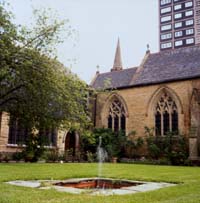Manchester becomes an Eco-Diocese
November 26, 2003:
 |
The Manchester Diocese includes:
Manchester, Salford, Ashton-under-Lyme, Oldham, Rochdale, Bury, Bolton, Leigh, Rawtenstall and parts of the boroughs of Trafford, Wigan and Stockport.
|
|
 |
 |
The Diocese of Manchester made a landmark decision on Saturday to become the leading “Environmental Diocese” in Britain.
The Environmental Policy for the Diocese of Manchester - passed by the local synod and prepared in consultation with the Alliance of Religions and Conservation (ARC) - urges all members to make some fundamental changes in how they, their colleagues and their friends work within the environment.
It asks employees, congregation members and office holders to examine the materials and natural resources they use, the travel arrangements they make, and their awareness of the environment.
 |
 |
 |
Worshippers at St Paul's in inner city Salford have created a sacred garden in their churchyard |
It is not intended to be merely a vaguely supportive document: instead it is meant to be a real call to action.
The paper draws on Christian theology to affirm that the Christian mission includes care for God’s earth, and to remember that the Biblical creation stories give human beings privilege and responsibility in relation to the earth and every living creature.
But it also goes further. It not only urges all Christians in the area to address their use of resources, it also announces a partnership with groups from other faiths to do the same.
The Diocese covers a large area in the North West of England stretching from Bolton to Stockport, including nearly 300 parishes, 199 Church of England schools and a population of two million people. It has one of the largest Muslim populations in the country, and the second largest Jewish population, outside London. So the interfaith partnership programme will be particularly important.
 |
| Agenda 21 developed out of the 1992 UN Earth Summit held in Rio. It aims to promote development respecting both the current environment and the needs of future generations. Much of the responsibility is at national level, but each Local Authority is required to develop a set of Local Agenda 21 policies. They are required to consult people and groups and this is where the churches can play a role.
|
|
 |
 |
Some of the areas highlighted for action and change so far are:
* ensuring that Diocesan activities comply with all relevant environmental regulations.
* ensuring that all Diocesan employees and office holders are familiar with, and are actively implementing, this environmental commitment
* encouraging the increased use of renewable energy
* encouraging re-use, repair and recycling of materials
* buying products which are made in accordance with the principle of sustainability and to use locally-made goods where practicable
* showing concern for the environmental quality of food production and the equitable global distribution of food
* avoiding unnecessary travel, sharing car transport, providing improved cyclist facilities and using energy efficient vehicles
ARC project manager John Smith said this was an exciting move. “Here is a Diocese not just saying we ought to care and that the faith tells us to care, but structurally building all this into the very way it functions.”
He said ARC was looking forward to helping the Diocese organise the stage-by-stage implementation of this policy. “One of the most important things is the inspiration this will provide to other Dioceses and to other faiths as well. It is a major breakthrough from words to action.”
Rt Rev Stephen Lowe, Bishop of Hulme is chairing the taskforce in charge of implementing this powerful new policy statement.
He was optimistic that the project will be successful in the long term, even though there were many potential obstacles. One of the ways the taskforce was intending to keep the enthusiasm going was to set up a monitoring group on the Bishops’ Council, he said.
“If we can show that we are concerned about the environment as a Christian community, and if we can show that we can make real changes – in our vicarages, our churches, our schools and our homes – then I hope that we can make a real difference.”
Many other dioceses in Britain have developed and are developing environmental policy statements, but none so far are as comprehensive as this Manchester initiative.
The project is being brokered by the Alliance of Religions and Conservation (ARC). Sponsors include WWF-UK .
For further details please contact John Smith at ARC. johns@arcworld.org
|

